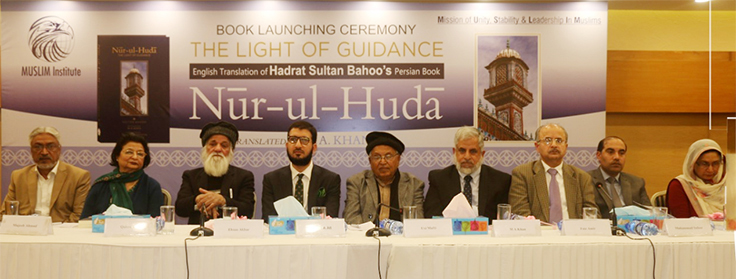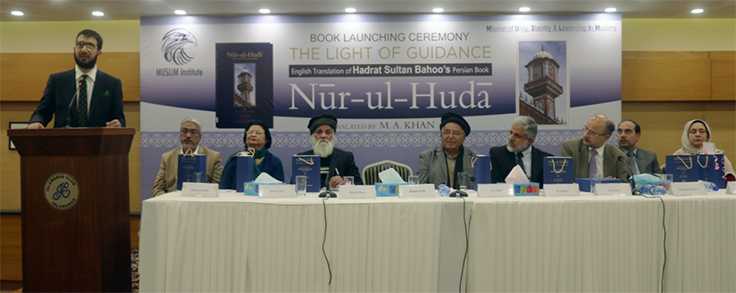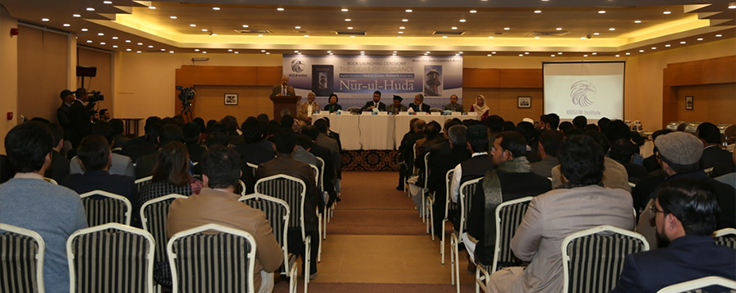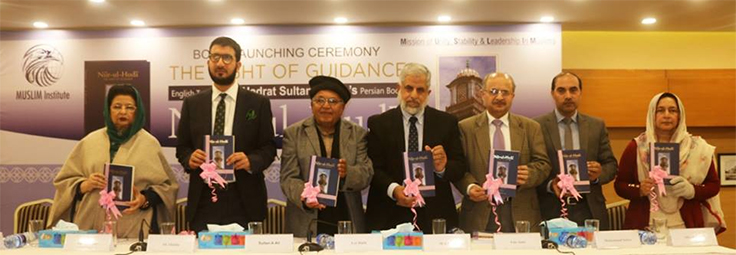| |
|
|
Book Launching Ceremony
The Light of Guidance
English Translation of
Haḍrat Sultan Bahoo's Persian Book
Nūr-ul-Hudā
Organised By
MUSLIM Institute (Islamabad)
|
|






|
|
MUSLIM Institute held book launching ceremony of English translation of the book ‘Nūr-ul-Hudā' ‘The Light of Guidance’ on Friday March 01, 2019 at Islamabad Club, Islamabad. The book is written in Persian by great Sufi saint Haḍrat Sultan Bahoo; translated in English by M. A. Khan with foreword by Prof. Dr. Gerhard Bowering (Yale University, USA) and published by Al-Arifeen Publications. Mr. Uxi Mufti (Author & Anthropologist) chaired the session whereas AVM (R) Faiz Amir (Vice Chancellor, Air University, Islamabad) was chief guest on the occasion. Sahibzada Sultan Ahmad Ali (Chairman, MUSLIM Institute) gave opening as well as closing remarks. Among other distinguished speakers were Prof. Ehsan Akbar (Writer & Poet), Dr. Qaisra Alvi (Former Director Women Campus International Islamic University, Islamabad), Justice Muhammad Khalid Masud (Director General of Islamic Research Institute, International Islamic University, Islamabad), Dr. Muhammad Safeer (HoD Persian, National University of Modern Languages , Islamabad), Dr. Mujeeb Ahmad, (HoD History & Pakistan Studies, International Islamic University, Islamabad) and Dr. Aliya Sohail Khan (Director Rawalpindi Campus, University of Gujrat). Mr. M. A. Khan (Translator of the Book) also shared his views on the occasion. Mr. Asif Tanveer Awan Advocate (Public Relations Associate, MUSLIM Institute) moderated the proceedings of the ceremony.
Speakers expressing their views in the ceremony observed as following:
|

(From left) Dr. Mujeeb Ahmad,
Dr. Qaisra Alvi,
Prof. Ehsan Akbar,
Sahibzada Sultan Ahmad Ali,
Mr. Uxi Mufti,
Mr. M. A. Khan,
AVM (R) Faiz Amir,
Dr. Muhammad Safeer and
Dr. Aliya Sohail Khan
|
|
The Nūr-ul-Hudā by Haḍrat Sultan Bahoo translated in English as “The Light of Guidance” serves in removing the darkness of heart, soul and mind caused by greed, lust, self-love, hypocrisy, vanity and worldly desires. Nūr-ul-Hudā is a masterpiece among other Sufi literature which works as the light for Tālib1. It gives hope even to weak hearts. Haḍrat Sultan Bahoo narrates, my book is neither copied nor compiled from anyone else’s work, I have written this book directly in accordance with the injunctions of the Holy Quran and Hadith Nabvi (ﷺ) so only an evil will deny it. Even the term Nūr-ul-Hudā is full of the secrets of Allah Almighty (ﷻ).
Translations have been playing a very decisive role in the evolution of human history. If we look back into the golden era of Muslims, they have been benefiting themselves from Greece and Roman arts and sciences while translating their works into Arabic. In Renaissance, Europeans translated these Muslims works into English. In contemporary era, China, Korea and Japan have also benefitted while translating foreign works into their respective languages. The trend of transfer of knowledge through translation has increased day by day. It also results in an increased cultural interaction between diverse cultural entities.
|
|
|
However, this effort by M. A. Khan is essentially followed by Sufi2 tradition of love, peace and harmony. Spiritual terms narrated by Haḍrat Sultan Bahoo in Nūr-ul-Hudā contain message of the Oneness of God, self-recognition through purification of the Self and Faqr3 are of prime subject. Mevlana Rumi also emphasized the similar stages in his Masnavi. Haḍrat Sultan Bahoo was not merely a Sufi but he was an Ārif4. Haḍrat Sultan Bahoo narrates that an Āshiq (lover of Allah) gets recognition of Allah Almighty (ﷻ) in his early stages.
Every individual should play his role in the dissemination of the Sufi message as M.A. Khan has given his contribution in this regard. This translation will benefit all of us especially those who cannot understand Persian. Some people ask about the evolution of Sufism or Sufi literature. Sufism started on the very day first human was sent on the earth. Sufism stems from the spiritual practices manifested by Holy Prophet (ﷺ) at the cave of Hira and then its great manifestation is in the form of practices of Ashaab-e-Sufa (the special companions of the Holy Prophet) under the guidance of Holy Prophet (ﷺ).
|
|
|
|
|

Participants view during the book launch ceremony.
|
|
Many of the early works of great Sufis mostly in Arabic and Persian are lost over time so is the case with some of the one hundred and forty Persian manuscripts written by Haḍrat Sultan Bahoo for which the Al-Arifeen Publications is striving to trace them out. These invaluable works like the current one Nūr-ul-Hudā may seem to us abstruse and in places even incomprehensible yet these are the secret knowledge of great visionaries who were blessed with intuitive knowledge of the spiritual dimensions of reality which we have lost as against the overly rational and empirical data of terrestrial world. Father of western philosophy, Socrates, never wrote anything, yet his philosophy is most potent, compelling oral tradition that lives on and refuses to die. The Sa-harfi and Abyat of Great Sufi saint likewise live on in the folk tradition of Punjab.
Nūr-ul-Hudā, path to enlightenment is an inspired work dictated by Haḍrat Sultan Bahoo in a state of divine intuition exchange often when he was seized in a spontaneous urge to divulge the secrets of the Self, he would dictate to his disciples impromptu with flow of his mouth like a flowing fountain. Extempore he would dictate pages on pages, books on books and that is how he authored one hundred and forty books in his short lifetime. Haḍrat Sultan Bahoo is not just a Sufi saint, he is not just a Punjabi poet. In fact, he is predominantly a great philosopher as well. His philosophy begins where western philosophy ends. It will perhaps take the West many decades before they are able to grasp his ideas on the secrets of the self. This book is about the secrets of the Self. Beyond all multiplicity, baffling clue of reality of phenomenon, farther than the duality of day and night, life and death, longing and despair and way beyond the impurities of day to day mundane terrestrial life, is a point that completes human vision.
|
|
|
This is the point of synthesis of all encompassing, all inclusive, complete and perfect wholeness, this point Haḍrat Sultan Bahoo calls the point Ālif. The final point Ālif means Oneness that Haḍrat Sultan Bahoo told in his poetry. Western philosopher spent a lifetime searching for the reality of human vision (the point Ālif). The American philosopher William James thought he was on the corner of this great discovery. Western philosophers were unable to discover Ālif and finally they turned away from philosophy to more pragmatic and practical pursuits. That is why our students never go for philosophy these days and our teachers don’t teach philosophy. None of our universities teach philosophy comprehensively so how would we understand Haḍrat Sultan Bahoo if we shun philosophy. Haḍrat Sultan Bahoo aptly known as Sultan-ul-Aarifeen (king of the secret knowledge of spiritual realms) had already warned that the point Ālif cannot be reached without the guidance of an accomplished Sufi master “A Mūrshid”; no wonder the western philosopher failed. Only such person can reach this pinnacle of knowledge of Almighty “Marifat” who takes the lesson of “Hoo” (the name of Allah) from the Mūrshid5. For Haḍrat Sultan Bahoo “Hoo” was a form of dhikr and deep remembrance of Ālif. Ālif is secret name of Allah Almighty (ﷻ), the path to knowledge for him is Tawhid (Oneness of Almighty Allah), the ultimate point of Oneness of Allah. This Ālif is also the secret of Paras6 (philosopher's stone) or the secret of Alchemy which Haḍrat Sultan Bahoo described as the Amal-e-Akseer7 which is not turning base metals such as mercury into gold rather transformation and spiritual evolution of the Self to discover the gold from within.
|
|
|

Stage view during the ceremony.
|
|

Stage and participant view during the ceremony.
|
|
|

Stage view during the book launch ceremony.
|
Notes
1. Tālib: طالب Dervīsh in quest of recognition of Allah Almighty (ﷻ), the desirous for Allah Almighty (ﷻ)
2. Sufi: A person who has adopted spiritual path in which he makes effort to purify his nafs
3. Faqr: Ultimate stage of utmost mystical level, spiritual excellence, some if not all of orientalises describes faqr as poverty which is inaccurate in the term of spirituality, Sultan Bahoo states in his Persian books “when faqr perfects it doesn’t have any form of need for such he has to ask or request someone. It’s name is without want or without any need” (Mehq-ul-faqr, 339), “world is grief and faqr is the name of Allah (ﷻ)” Ibid: 261. This term could not be used in this context, detachment of spirit from all multiplicity from the mind.
4. Ārif: عارف recognizer, the one who has the recognition of Allah Almighty (ﷻ), who attends the congregation of Rasool Allah (ﷺ) with his physical body
5. Mūrshid: Sufi master, who is bestowed the state of mūrshid by the court of Rasool Allah (ﷺ)
6. Paras: پارس Invaluable expensive, this is a Persian word and it is used in this context
7. Akseer: اکسیر Concentration of Ism-e-Allah Zaat (ﷻ), spiritual knowledge that turns dust into gold with glance
|
| |
|
|
|
|
|
| |
|